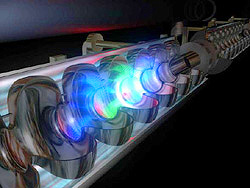URL: https://www.desy.de/news/news/archive_before_2010/2003/ilc_0502_/index_eng.html
Breadcrumb Navigation
Impetus for TESLA!
DESY Welcomes Decision of the Federal Research Ministry on Large-Scale Facilities

After the two TESLA projects had been assessed by the German Science Council with excellent results last November, the Federal Minister of Education and Research Edelgard Bulmahn released her decision of the Federal Government today on the planned large-scale facilities:
1. DESY will receive the TESLA X-ray laser, which is to be realized as a European project, and Germany will bear half of the costs because of the advantage of location.
2. Today, there will be no proposition for a German location for the TESLA linear collider. The decision is related to the fact, that the project is to be realized in a world-collaboration. Previous to the decision making for a location of the TESLA linear collider, it will be necessary to wait for the developments on the international level. The internationally embedded research work for the project will be continued by DESY, in order to make possible a German participation in a future global project.
"DESY welcomes the rapid and trend-setting statement of the Federal Government on the large-scale research facilities and sees it as a tremendous chance for TESLA. It strengthens the Helmholtz-Association playing the role of an operating agency for large-scale research facilities," said the Chairman of the DESY Directorate, Professor Albrecht Wagner in a first reaction. "The possibility to realize the TESLA X-ray laser as a European project at DESY opens up outstanding research possibilities for Germany and Europe. For the linear collider for particle physics which is being planned on a longer-term basis, DESY is able to continue the international research work."
On the basis of the decision published today by the Federal Minister of Education and Research, Edelgard Bulmahn, the preparations for TESLA will now enter a new phase: Concerning the X-ray laser project, the first step will be to work out the financial, technical and organizational framework with the interested European partners.
The decision of the Federal Ministry of Education and Research (BMBF) to await the course of the international developments before recommending a site for the TESLA linear collider, while renewing its support of the research and development work for such a collider, allows DESY and its partners to continue with the political and technological coordination and decision process which is currently in progress at an international level. The declared goal is to operate a linear collider as an international research facility for particle physics in the next decade either in America, Asia or Europe (i.e. at DESY).
TESLA stands for TeV-Energy Superconducting Linear Accelerator, i.e. a particle accelerator operating at extremely high energies (teraelectronvolts). The special and world-wide unique feature of this concept is the use of superconducting acceleration structures which have to be cooled down to minus 271 degrees Celsius. The development works for TESLA started ten years ago at the initiative of DESY and are now being carried out in a joint effort by 46 institutes from 12 countries at a test facility in Hamburg. The superconducting technology is to be employed in both projects. In the 33-kilometer-long TESLA linear collider, it will provide the means of producing particle collisions at highest energies, which will allow physicists to take a closer, more detailed look than ever before at the smallest dimensions and the origin of matter and the universe. The superconducting electron accelerator of the TESLA X-ray laser will serve as a source of intense and extremely short X-ray flashes with laser properties which will open up completely new research opportunities for the natural sciences. The wavelength of the laser light is so small that even atomic details become discernible; the wavelength can be varied in the range of six to one-tenth of a nanometer. The highly intense, ultra-short X-ray flashes enable researchers to record what are essentially films from the microscopic world - to monitor, for example, how a chemical reaction progresses atom for atom -, to study the processes occurring inside materials or to unveil the structure of biological molecules.
In her statement, the Federal Minister of Education and Research Edelgard Bulmahn says:
"The research center DESY in Hamburg will receive a novel free-electron laser. Because of the location advantage, Germany is disposed to bear half of the investment costs amounting to 673 million Euro. The discussion about a European cooperation will begin very soon, so that a decision to start construction can be made in about two years. Construction time will take approximately 6 years.
Today, there will be no proposition for a German location for the TESLA linear collider. The decision is related to the fact, that the project is to be realized in a world-collaboration. Therefore, it will be necessary to wait for the developments on the international level. A German solitary decision regarding the location is neither reasonable nor necessary. However, DESY will continue the internationally embedded research work, in order to make possible a German participation in a future global project."


